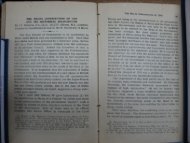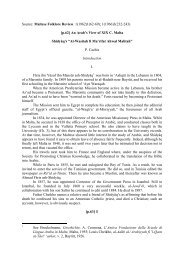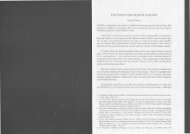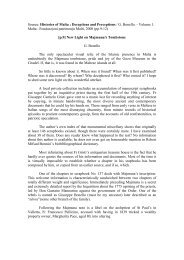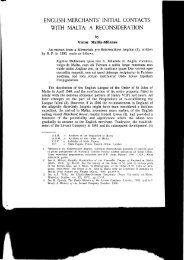essays on de soldanis
essays on de soldanis
essays on de soldanis
You also want an ePaper? Increase the reach of your titles
YUMPU automatically turns print PDFs into web optimized ePapers that Google loves.
ESSAYS ON DE SOLDANIS<br />
had a good practice and was physician to St. Bartholomew’s<br />
and to Christ’s Hospitals... He helped to <strong>de</strong>velop the<br />
taste for curious manuscripts, scarce editi<strong>on</strong>s, and fine<br />
copies’. Before taking the <strong>de</strong>gree of M.D. and establishing<br />
himself in L<strong>on</strong>d<strong>on</strong> he studied for <strong>on</strong>e year in Ley<strong>de</strong>n and<br />
he then visited Hungary, Athens, C<strong>on</strong>stantinople, Italy<br />
and other countries. He is the author of a manuscript<br />
volume of Greek inscripti<strong>on</strong>s, now preserved in the<br />
British Museum. 39<br />
Askew’s name also figures in a letter to <strong>de</strong> Soldanis,<br />
written in Italian by an Englishman, Thomas Blackburne,<br />
in July 1749. He wrote from Messina to thank <strong>de</strong> Soldanis<br />
for the hospitality exten<strong>de</strong>d to him during his stay in Gozo<br />
and went <strong>on</strong> to say that at the beginning of June Mr Askew<br />
was still in Holland and it was doubtful whether he had<br />
returned home. As for him (Blackburne) he had enjoyed<br />
his tour of Sicily where he had come across a history of the<br />
antiquities of Rome which he had sent to him, knowing that<br />
he was keen <strong>on</strong> antiquities. 40 I have not been able so far to<br />
trace any informati<strong>on</strong> about Blackburne in the standard<br />
reference works c<strong>on</strong>sulted.<br />
Like other eighteenth century Maltese men of letters,<br />
<strong>de</strong> Soldanis had a good knowledge of Italian. All al<strong>on</strong>g,<br />
however, he was c<strong>on</strong>scious that Italian was not his mother<br />
t<strong>on</strong>gue and he mo<strong>de</strong>stly showed his readiness to have his<br />
Italian text improved when still in manuscript. As early as<br />
1746 he stressed in his preface to Il Gozo antico-mo<strong>de</strong>rno that<br />
after 12 years of literary isolati<strong>on</strong> in Gozo he found that his<br />
style nee<strong>de</strong>d polish and improvement. There is a genuine<br />
note of mo<strong>de</strong>sty in his words:<br />
39 Dicti<strong>on</strong>ary of Nati<strong>on</strong>al Biography ii (L<strong>on</strong>d<strong>on</strong>, 1885), 192-93. See also E.<br />
Benezit, Dicti<strong>on</strong>naire critique et documentaire <strong>de</strong>s Peintres, Sculpteurs,<br />
Dessinateurs & graveurs <strong>de</strong> tous le temps et <strong>de</strong> tous les pays... ii (Paris, 1924), 8.<br />
40 NLM Libr. 146 ii, ff. 243r-244r.<br />
18



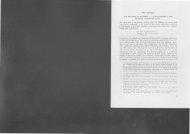

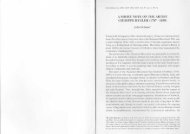
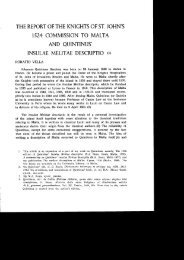
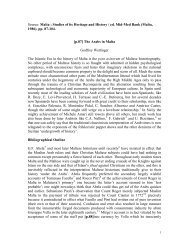
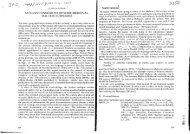
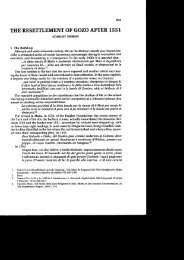
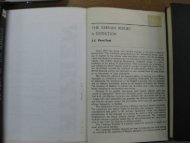

![Source: The Sunday Times [Malta]](https://img.yumpu.com/35239166/1/184x260/source-the-sunday-times-malta.jpg?quality=85)
